- Home
- Rabindranath Tagore
Chokher Bali Page 7
Chokher Bali Read online
Page 7
With an extremely oblique smile, Binodini said, ‘As the husband’s younger brother, you have a special position of kinship. Why beg where you can demand your rights? You can snatch affection by force. What do you say, Mahendrababu?’
Mahendra was speechless.
‘Biharibabu, is it due to embarrassment or anger that you refuse to eat? Must someone else be summoned?’ asked Binodini.
‘There is no need. What I have received is more than enough.’
‘Such mockery? It’s impossible to keep up with you in this. Even sweets are not enough to silence your tongue.’
At night, Asha told Mahendra how upset she was with Bihari. Mahendra did not laugh it off as on other days; he was in complete agreement with her.
At dawn, immediately upon awakening, Mahendra went to Bihari’s house. ‘Bihari,’ he said, ‘Binodini is not quite a member of our own family, after all; she seems rather irritated if you appear in her presence.’
‘Is that so? Then it’s not a good idea. Since she objects, I might as well avoid appearing before her.’
Mahendra was relieved. He had not imagined that this unpleasant task would be accomplished so easily. He was afraid of Bihari.
That very day, Bihari went to the private quarters of Mahendra’s house and spoke to Binodini. ‘Binod Bouthan, you must forgive me.’
‘Why, Biharibabu?’
‘I heard from Mahendra that you are annoyed by my presence in the private quarters of the house. I am here to beg your forgiveness and leave.’
‘How is that possible, Biharibabu? I am here today, gone tomorrow; why would you leave on my account? Had I known there would be such complications, I would not have come here at all.
With these words, a dejected Binodini hurried away, as if to control her tears.
For an instant, Bihari thought, ‘I have injured Binodini’s feelings by my false suspicions.’
That evening, Rajalakshmi came to Mahendra with a troubled expression. ‘Mahin, Bipin’s wife is determined to go back home,’ she said.
‘Why, Ma, what discomfort does she suffer here?’
‘No discomfort. Bahu says people will cast aspersions on her character if a young widow like her remains for too long in someone else’s home.’
Offended, Mahendra said, ‘Is this home someone else’s then? Not her own?’ He cast an accusing glance at Bihari who was sitting nearby.
‘There was a hint of criticism in my words yesterday,’ thought Bihari, penitently. ‘Perhaps that is what has hurt Binodini’s feelings.’
Both husband and wife adopted a reproachful attitude towards Binodini. One asked, ‘Do you consider us strangers, friend!’
‘After all these days, to call us strangers!’ protested the other.
‘My friends, would you hold me captive forever?’ demanded Binodini.
‘Would we dare do such a thing?’asked Mahendra.
‘Then why did you steal our hearts in this fashion?’ said Asha, accusingly.
That day, nothing was decided. ‘No, my friends,’ insisted Binodini, ‘it’s better not to develop such attachments when they are only temporary.’ With these words, she cast a desperate glance at Mahendra.
The next day, Bihari came to her. ‘Binod Bouthan, why do you speak of going away? Is it to punish me for some offence that I have committed?’ he asked.
Slightly averting her face, Binodini replied, ‘The fault is not yours; my destiny is to blame.’
‘If you go away, I shall always feel that you left because you were angry with me,’ said Bihari.
Binodini looked beseechingly at Bihari, and asked: ‘You tell me, would it be appropriate for me to stay?’
Bihari was caught in an awkward position. How could he say that it was appropriate for her to stay? He answered, ‘You would certainly have to leave, but what is the harm in staying a few days longer?’
Lowering her eyes, Binodini said, ‘All of you are asking me to stay. It is difficult for me to ignore your requests, but it is very wrong of you all.’ As she spoke, enormous teardrops fell from beneath her long, dark eyelashes.
Unable to bear this flood of silent tears, Bihari exclaimed, ‘In the few days since your arrival, you have captivated everyone with your talents. That is why nobody wants to let you go. Please don’t mind, Binod Bouthan, but who would willingly part with such a wonderful lady?’
Asha had been sitting in a corner with her head covered. She began to wipe away her tears with the corner of her aanchal.
After this, Binodini did not speak of leaving.
17
To wipe out the memory of this recent unpleasantness, Mahendra proposed, ‘Let’s go on a picnic to the orchard at Dumdum this Sunday.’
Asha was very excited. But Binodini would not agree to the plan. Mahendra and Asha were extremely downcast at Binodini’s objections. ‘Nowadays Binodini seems rather remote,’ they thought.
In the evening, as soon as Bihari arrived, Binodini complained, ‘Look at this Biharibabu! Mahinbabu wants to go to the Dumdum orchard on a picnic, but because I am reluctant to accompany them, the two of them have been sulking since morning.’
‘Their anger is not uncalled for. If you don’t accompany them, their picnic would be the kind of disaster that one would not wish upon one’s worst enemy.’
‘Why don’t you come with us, Biharibabu? If you come along, I am willing to join the party, too.’
‘An excellent suggestion. But we must do as the master decrees. What does the master say?’
Both husband and wife were secretly offended at Binodini’s partiality towards Bihari. Half of Mahendra’s enthusiasm evaporated at the prospect of taking Bihari with them. Mahendra wanted to impress upon his friend that Binodini found his presence unpleasant at all times. But after this, it would be hard to hold Bihari back.
‘Well then, it’s a good idea,’ said Mahendra. ‘But Bihari, you never fail to create a disturbance wherever you go. Perhaps you will get all the boys of the locality to gather at the venue, or get into fisticuffs with some white man—who can predict what you might do?’
Inwardly amused at Mahendra’s heartfelt dismay, Bihari declared, ‘That’s the fun of living in this world: it’s impossible to predict how one thing may lead to another, or what problems may crop up at any juncture. Binod Bouthan, we must leave at dawn; I shall be here on time.’
At dawn on Sunday, a third-class carriage was hired for the attendants and all the equipment, and a second-class carriage for the family. Bihari arrived on time, bringing with him an enormous box.
‘What’s that you have brought?’ asked Mahendra. ‘There is no room left in the servants’ carriage.’
‘Don’t worry, Dada, I shall take care of everything.’
Binodini and Asha entered the carriage. Mahendra hesitated a bit, wondering what to do with Bihari. Hoisting his load onto the roof of the carriage, Bihari quickly climbed onto the coachbox.
Mahendra heaved a sigh of relief. He had been thinking, ‘There’s no saying what Bihari might do, he might even seat himself inside the carriage.’
Anxiously, Binodini asked, ‘Biharibabu, you won’t fall off, will you?’
‘Have no fear,’ Bihari assured her, ‘my role in the script does not warrant falling and fainting.’
As soon as the carriage set off, Mahendra proposed, ‘I may as well go and sit up there, and send Bihari to sit inside.’
Asha clutched at his wrap. ‘No, you cannot go.’
‘You are not used to it,’ Binodini pointed out. ‘What if you fall off? There’s no need.’
‘Fall off? Never!’ In his excited state, Mahendra immediately prepared to go out.
‘You blame Biharibabu, but it is you who are the supreme troublemaker,’ declared Binodini.
‘Very well, I have an idea,’ responded Mahendra gravely. ‘Let Bihari come and sit inside. I shall go in a separate hired carriage.’
‘In that case, I shall go with you as well,’ insisted Asha.
‘And am I
supposed to jump off the carriage?’ demanded Binodini. On this confused note, the matter ended.
All the way, Mahendra maintained a very grave countenance.
The carriage arrived at the Dumdum orchard. The servants’ carriage had set out much earlier, but there was no sign of it yet.
It was an exquisite autumnal dawn. The rising sun had dried out the dew, but the foliage glistened in the pure light of day. Against the wall were rows of shefali trees, the ground beneath them a fragrant carpet of flowers.
Released from the imprisoning brick walls of Kolkata into the freedom of the garden, Asha was exhilarated, like a wild doe. She and Binodini gathered a mass of flowers from the ground, and sat beneath the wood-apple tree munching the ripe fruit they had plucked from it. Together, the two friends threw themselves into the pond and enjoyed a long bath. The dappled shade beneath the trees, the waters of the pond and the flowers and leaves of the arbour were infused with a joyous spirit by the playful spontaneity of these two women.
Returning from their bath, they found that their attendants’ carriage had not yet arrived. Mahendra sat on a chowki placed on the veranda, with an extremely sour expression, reading the advertisement for a British store.
‘Where is Biharibabu?’ asked Binodini.
‘I don’t know,’ replied Mahendra curtly.
‘Come, let’s find him.’
‘There is no fear of his being abducted. He will be found even without being sought.’
‘But he may be dying of worry about you, lest a precious jewel be lost. Let us go and reassure him.’
Beside the pond was an enormous banyan tree, with a paved area around its base. Bihari had taken out a kerosene stove from his box and was now heating up some water. As soon as everyone arrived, he displayed great hospitality, seating them on small raised platforms built for the purpose and serving them individual cups of tea and sweetmeats arranged on small dishes.
Binodini remarked, again and again, ‘Thank goodness Biharibabu had arranged to carry all the required items! Imagine Mahendrababu’s condition if tea had not been available.’
Though the tea had brought him great relief, Mahendra complained, ‘Bihari always goes to extremes. We have come here on a picnic, but even here, he has made such elaborate arrangements. There’s no fun in it.’
‘Very well, my friend, then return your cup of tea,’ retorted Bihari. ‘Go and have fun without food, I shall not stop you.’
The day grew long, but the attendants did not arrive. All kinds of eatables kept emerging from Bihari’s box. Rice and dal, vegetables, and even ground spices in tiny bottles were discovered there.
‘Biharibabu, you have outdone all of us,’ exclaimed Binodini in amazement. ‘Without a woman to keep house for you, how did you learn all these things?’
‘I learnt in order to survive. I have to take care of my own needs.’ Bihari spoke in jest, but Binodini grew grave; her eyes showered pity on him.
Together, Bihari and Binodini applied themselves to the task of cooking a meal. When Asha made a feeble, self-conscious attempt to lend a hand, Bihari stopped her. The inept Mahendra made no attempt to help at all. Leaning against a tree trunk, his legs crossed, he fixed his gaze on the rays of sunshine dancing on the trembling banyan leaves.
When the cooking was almost done, Binodini called, ‘Mahinbabu, you will never finish counting those banyan leaves. Now go and have your bath.’
At long last, the party of attendants arrived, along with all the provisions. Their carriage had broken down on the way. It was now well past afternoon.
After their meal, it was proposed that they play a game of cards under the same banyan tree. Mahendra would have none of it, and in no time at all, he fell asleep in the shade of the tree. Asha went inside the building, shut the door and prepared to take some rest.
Partially covering her head with her aanchal, Binodini said, ‘Let me go to my room, then.’
‘Please don’t go, let’s talk awhile,’ urged Bihari. ‘Tell me about your native place.’
From time to time, the warm afternoon breeze murmured through the leafy treetops, and every now and then, the koel called from the deep foliage of the jamun tree beside the pond. Binodini spoke of her childhood days, her parents, and her playmates. As she spoke, the covering on her head slipped off, and the shadow of childhood memories softened the fierce radiance of youth that always shone from her countenance. Until now, the piercing mockery in Binodini’s sidelong glance had aroused all kinds of suspicions in the mind of the sharp-eyed Bihari, but when that dark brilliance faded into a quiet, tear-moist expression, Bihari felt he was seeing a different person altogether. At the core of this radiance was a tender heart still flooded with the nectar of love, its femininity not yet shrivelled by the fire of an unquenched desire for enjoyment, frivolity and self-indulgence. Until now, Bihari had never for a single moment tried to imagine Binodini as a modest, chaste wife, devotedly serving her husband, or as a loving mother holding her child in her lap. Today, it was as if the curtains of the stage had parted for an instant, affording him a glimpse of the beautiful scene backstage. Bihari thought, ‘Though outwardly frivolous, Binodini is really a pious woman with austere habits.’
‘Human beings can’t recognize their own true selves,’ sighed Bihari to himself. ‘Only God knows such things. Outward appearances produced by the force of circumstance are taken for truths by the world at large.’ Bihari did not allow Binodini’s narrative to end; he kept it going by asking a series of questions. Until now, Binodini had never found a listener to whom she could say all these things in this fashion; she had never spoken to any man in such an unselfconscious, natural way. Today, as she spoke in her fluent, sweet voice of the simplest thoughts in her heart, her very nature seemed to become gentle and contented, as if bathed in a fresh shower of rain.
Tired after the effort of having risen at dawn, Mahendra awoke at five o’clock. ‘Now let us prepare to return,’ he ordered, irritably.
‘What is the harm if we return a little later in the evening?’ asked Binodini.
‘No, we might fall into the clutches of some drunken white man,’ Mahendra replied.
By the time they packed up all the things, it had grown dark. At this moment, an attendant came to inform them, ‘The hired carriages have gone; they are nowhere to be found. They were waiting outside the orchard, but two white men bullied the coachmen into driving the carriages to the station.’
The attendant was sent to fetch another carriage.
‘This day has been ruined, to no purpose,’ Mahendra muttered to himself in annoyance. He could no longer conceal his impatience.
From a horizon entangled in a web of branches, the moon in its bright quarter arose gradually, ascending the open sky. The still, silent orchard seemed etched in a shadowy light. Tonight, in this magical world, Binodini felt a strange, exquisite self-awareness. Tonight, when she embraced Asha in the arbour, it was not from a pretence of love. Asha saw tears streaming from Binodini’s eyes. Concerned, she asked, ‘Why, my dear Chokher Bali, why do you weep?’
‘It’s nothing, my friend, I am fine. I have really enjoyed this day.’
‘What was it you enjoyed so much, my friend?’
‘I feel as if I have died and entered the afterworld; as if here, in this place, everything is mine for the asking.’
Bewildered, Asha understood nothing of what she said. Saddened by the mention of death, she protested, ‘For shame, dear Chokher Bali, do not speak of such things.’
A carriage was found. Bihari again ascended the coachbox. Binodini gazed in silence at the scene outside—frozen in moonlight, the rows of trees passed before her eyes like a deep, flowing stream of shadows. Asha fell asleep in a corner of the coach. Throughout the long journey, Mahendra sat in utter dejection.
18
After the disastrous picnic, Mahendra was eager to reclaim his power over Binodini. But the very next day, Rajalakshmi developed influenza. It was not a serious illness, but it caused suf
ficient discomfort and weakness. Binodini remained busy day and night, looking after her.
‘If you slave like this, you will eventually fall sick yourself,’ Mahendra warned her. ‘I shall engage a nurse to take care of Ma.’
‘Mahinda, don’t be so anxious,’ said Bihari. ‘Let her continue to look after your mother. Could anyone else match her devotion?’
Mahendra began to visit the invalid’s chamber several times during the day. That a man should remain idle, yet be constantly by her side while she was at work, was intolerable to the efficient Binodini. She frequently protested, ‘Mahinbabu, what purpose does it serve for you to remain sitting here? Please go away—don’t miss college for no reason.’
It gave Binodini pride and pleasure that Mahendra was following her around, but to see him behave like an abject beggar, lusting after her even while sitting beside his mother’s sickbed, made her impatient and contemptuous. When a task awaited her attention, Binodini forgot all else. As long as it was necessary for her to attend to meals, look after a patient or perform domestic chores, Binodini was never known to shirk; in times of need, she could not tolerate any unnecessary complications.
Sometimes, Bihari would pay a brief visit to find out how Rajalakshmi was doing. Immediately upon entering the room, he would gauge what was required, notice what was lacking, and in an instant, he would set things in order and leave the room. Binodini sensed that Bihari viewed her devoted nursing with respect. Hence, she found Bihari’s visits particularly rewarding.
Feeling rejected, Mahendra began attending college, adhering to a very strict schedule. His temper remained extremely volatile, and to make matters worse, things had changed drastically! Meals were no longer ready on time, the coach driver often disappeared, the holes in his socks grew larger and larger. Mahendra did not consider this disorderliness amusing any more; he had briefly experienced the comfort of having things beautifully arranged and ready at hand whenever required. In the absence of that comfort, Mahendra no longer found Asha’s ineptitude charming.

 Selected Poems
Selected Poems The Lover of God
The Lover of God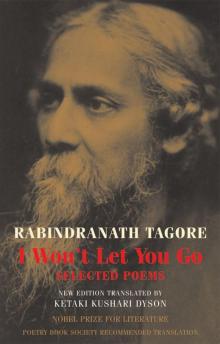 I Won't Let You Go: Selected Poems
I Won't Let You Go: Selected Poems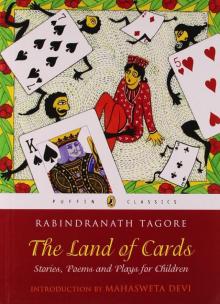 The Land of Cards: Stories, Poems, and Plays for Children
The Land of Cards: Stories, Poems, and Plays for Children The Tagore Omnibus, Volume One
The Tagore Omnibus, Volume One The Boat-wreck
The Boat-wreck Chokher Bali
Chokher Bali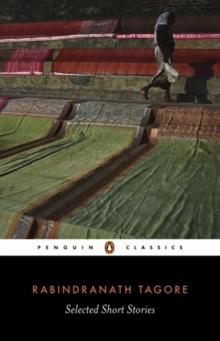 Selected Short Stories
Selected Short Stories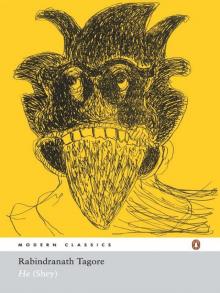 He (Shey)
He (Shey) Letters From a Young Poet 1887 1895
Letters From a Young Poet 1887 1895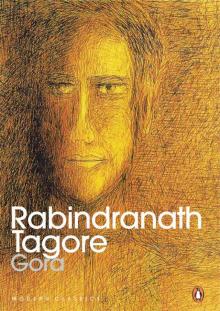 Gora
Gora Tagore Omnibus, Volume 1
Tagore Omnibus, Volume 1 Selected Poems (Tagore, Rabindranath)
Selected Poems (Tagore, Rabindranath)